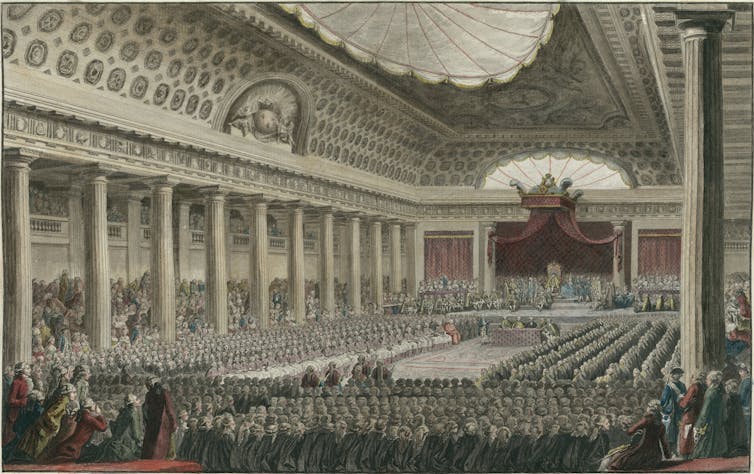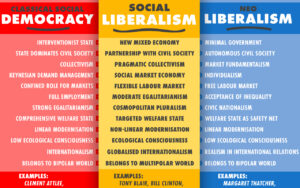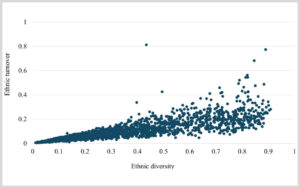By Simon McCarthy-Jones, Trinity College Dublin
Europe is anticipated to take a sharp right turn in this year’s European parliament elections. The past decade has already seen a rightward shift in India, and the United States has the greatest gap between left and right for 50 years. In light of these global trends, it’s crucial to understand what being “right-wing” actually means, rather than simply using the term as an insult.
The idea of “the right” originated in the French National Assembly of 1789. There, it described those who supported giving the king veto powers (who were to gather on the right hand side of the assembly hall). Today, however, “the right” covers a wide range of political positions.
Some are mainstream, such as conservatism (focusing on tradition and order), nationalism (promoting national sovereignty and identity), and neoliberalism (supporting free markets and small government). Others are more radical, including the far right, alt-right, and deep right. New variants continue to emerge, like national conservatism and forms of post-liberalism.
Such diversity makes it hard to define what being right-wing entails. Yet, a recent study of over 5,000 people in the US shed new light on the matter.
The five signs
This study, which used a more robust approach than much previous research, found that the more strongly someone identified as conservative or right-wing, the more likely they were to agree with five specific viewpoints:
1. Belief in hierarchy. Most indicative of being on the political right was seeing the world as naturally hierarchical. This means believing that everything, from people to animals and objects, can be ranked based on their importance, quality or value. It’s not that people on the right want the world to be this way; they just think it naturally is.
2. Sense that the universe has purpose. Right-wing people tended to believe there was more to the universe than just the mechanical movement of molecules. They believed it was in some sense alive and felt there was a deeper reason or purpose behind events.
3. Acceptance of the status quo. Rather than striving to constantly improve the world, those on the right were more inclined to accept things as they were. They didn’t necessarily see the world as something that always needs fixing or changing.
4. Resistance to new experiences. Being right-wing was linked with a certain reluctance to try new things. This mindset opposes the idea that everything is worth trying or doing at least once.
5. Belief in a just world. Right-wing people tended to believe that the world is a place where working hard and being nice pays off. In such a world, people get what they deserve.
It is easy to see how common right-wing preferences, such as valuing tradition, religion, authority, personal responsibility, family and country, follow from these five beliefs.

Wikipedia/Bibliothèque nationale de France
Why do people become right-wing?
Contrary to popular opinion, people don’t simply become more conservative as they age. Our political views stay pretty consistent throughout our lives. Instead, many factors influence the development of right-wing beliefs.
Genes gently mould our political views. About 40% of the difference between people’s political beliefs can be linked to their genetic makeup.
Some, but not all, researchers think this is because genes impact aspects of personality, such as openness to experience, which shape our political views. Genes could also make people more sensitive to threats from changing circumstances, encouraging right-wing beliefs.
You may wonder what right-wing adults were like as children. One study found that young conservative adults had often been preschoolers who felt “easily victimized, easily offended, indecisive, fearful, rigid, inhibited, and relatively over-controlled and vulnerable”.
This could have been a result of parental upbringing, which can also shape people’s political views. Research has found that young right-wing adults were more likely to have had authoritarian parents when they were infants.
All this creates right-wing brains. For example, young right-wing adults tend to have an amygdala – part of the brain linked to fear and uncertainty – that is both larger and more active in the face of threat.
Yet the state of society also influences how common right-wing beliefs are. The more threats a country faces, such as high unemployment, inflation and murder rates, the more common right-wing beliefs are.
Living with the right
Such research could lead you to think that people hold right-wing views simply because they are scared and unadventurous. The right already face the prejudice that their beliefs result from their being “mentally troubled”, stupid, or immoral.
This leaves little space for the alternative idea that people hold right-wing beliefs after careful thought about the nature of humans and the world. Those with different political beliefs may disagree with the right’s conclusions. Yet it is always easier to denigrate the character of right-wing people than to evaluate the validity of right-wing ideas.
In reality, being on the right doesn’t mean poor psychological health. Having right-wing views are not linked to unhappiness, low self-esteem or lower life satisfaction.
Nor can the entire right-wing be dismissed as immoral. The right simply has different moral foundations to the left. Left-wing morality focuses on preventing harm and being fair. While these issues also matter to the right, right-wing morality additionally emphasises respect for authority, purity and loyalty.
This leaves us with the left’s perception that people on the right are more stupid than evil. Here things get complicated. People with worse thinking skills are more likely to endorse right-wing beliefs. Conservative political beliefs are linked to a lesser ability to hold information in mind, plan and adapt to changing situations.
However, it could be that right-wing people are simply less motivated to do well on such tasks. Furthermore, holding right-wing economic views may be linked to better thinking skills, while left-wing authoritarianism is linked to poorer thinking skills.
Crucially, all this tells us precisely nothing about the validity of right-wing ideologies. These must be judged on their merits, not their holders.
As societies become more politically divided, appreciating different viewpoints is essential to fostering dialogue and mutual understanding. When election time arrives we must debate with ideas rather than disparage with labels.![]()
Simon McCarthy-Jones, Associate Professor in Clinical Psychology and Neuropsychology, Trinity College Dublin
This article is republished from The Conversation under a Creative Commons license. Read the original article.






















